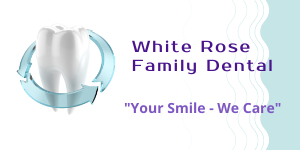A crucial factor in maintaining a healthy smile is your diet. While brushing and flossing are essential components of dental hygiene, a healthy diet also plays a significant role in the health of your teeth and gums but is often overlooked. Diet and dental health are closely linked.
Read on to explore how your foods and beverages can bolster or undermine your oral health. The following tips from a dentist in York, PA, will guide you from steering clear of sugary pitfalls to embracing nutrient-rich choices; these tips uncover the key dietary habits that will pave the way to a beautiful smile throughout your life.
1. Limit Sugary Foods and Beverages
Foods with a lot of sugar contribute to tooth decay by feeding the harmful bacteria in your mouth. This leads to increased acid production that can erode the enamel of your teeth and increase the risk of cavities. Sugary drinks like sodas and juices are also culprits. Limiting your consumption of candies, cakes, and other sugary treats is an important first step in avoiding cavities and tooth decay.
2. Choose Water
Drinking water instead of sugar-laden beverages is a great option for maintaining dental health. Water rinses away food particles and will help keep your mouth hydrated throughout the day. Hydration supports saliva production which helps to neutralize the acids in your mouth and reduce the risk of tooth decay.
3. Eat a Balanced Diet
A diet rich in fruits, vegetables, lean proteins, and whole grains provides the nutrients necessary for healthy teeth and gums. Try to choose a variety of foods each day to support your overall health. The calcium found in leafy greens and low-fat dairy contributes to strong bones and teeth. Fruits and vegetables contain vitamins and antioxidants that can help protect gum tissue from inflammation and infection. Whole grains contain nutrients like B vitamins and iron, which are beneficial for gum and oral health.
4. Snack Smartly
Try to avoid snacking if you can. Constantly snacking can cause your mouth to remain acidic, potentially leading to tooth decay and cavities. If you do snack, choose crunchy fruits and vegetables (e.g., apples, carrots) because they require a lot of chewing, which will stimulate the flow of saliva. Likewise, drinking water after snacking can help rinse your mouth of food debris and neutralize acid levels. Dairy products such as cheese or yogurt can also be smart choices for snacks because they neutralize the acids in your mouth.
5. Limit Acidic Foods and Drinks
Acidic foods and beverages can, over time, erode the enamel on your teeth. Citrus fruits, tomatoes, and vinegar-based dressings should be enjoyed in moderation. If possible rinse your mouth with water after consuming. The same goes for coffee. Coffee and other acid beverages do not directly cause cavities, but they can accelerate the process of tooth decay by dropping the pH levels of your mouth.
6. Chew Sugar-Free Gum
Chewing sugar-free gum between meals can help stimulate saliva production, neutralizing acids thereby helping to wash away food particles. Studies show that gum sweetened with xylitol may help to prevent tooth decay. Chewing gum can also help take away the desire to snack.
7. Limit Sticky Foods
Limiting sticky foods like caramel, dried fruits, and chewy candies that cling to teeth is especially important because they get stuck in the grooves of your teeth, increasing the risk of decay. If you indulge in sticky treats, brush and floss thoroughly afterward to minimize the risk of cavities.
8. Be Mindful of Timing
It’s not just what you put in your mouth that matters, but also the timing. If you eat sugar or acidic foods, try to do so with your meals rather than as snacks throughout the day. This will reduce the amount of time that your teeth are exposed to harmful substances and give your saliva a chance to neutralize acids. You can also eat acid-neutralizing foods after a sweet meal or dessert to help prevent cavities. Try a cube of cheese, a cup of yogurt, or carrot and celery sticks.
In addition to being mindful of your diet, practicing good oral hygiene is essential to maintaining oral health. Brushing twice a day and flossing daily can help preserve the health of your teeth and gums for years to come. Regularly scheduled dental appointments for checkups and cleanings are also important. Your dentist can alert you to any problem areas and will be able to suggest personalized diet changes for your particular oral health needs.
Following these tips for a tooth-friendly diet is just the beginning. To get started, call us today at (717) 822-0272 or click here to schedule your appointment.
